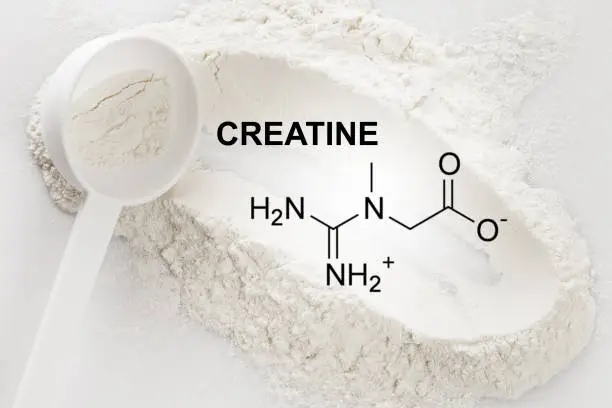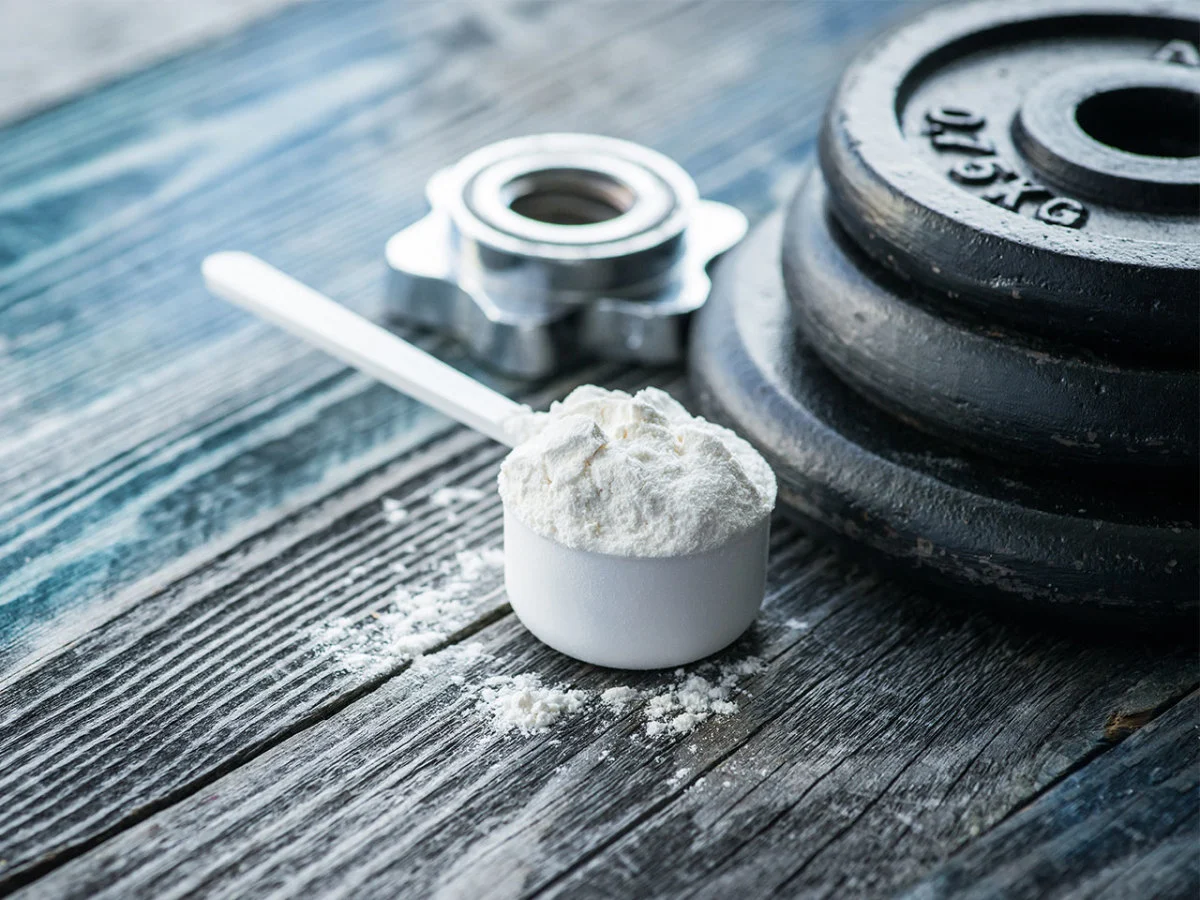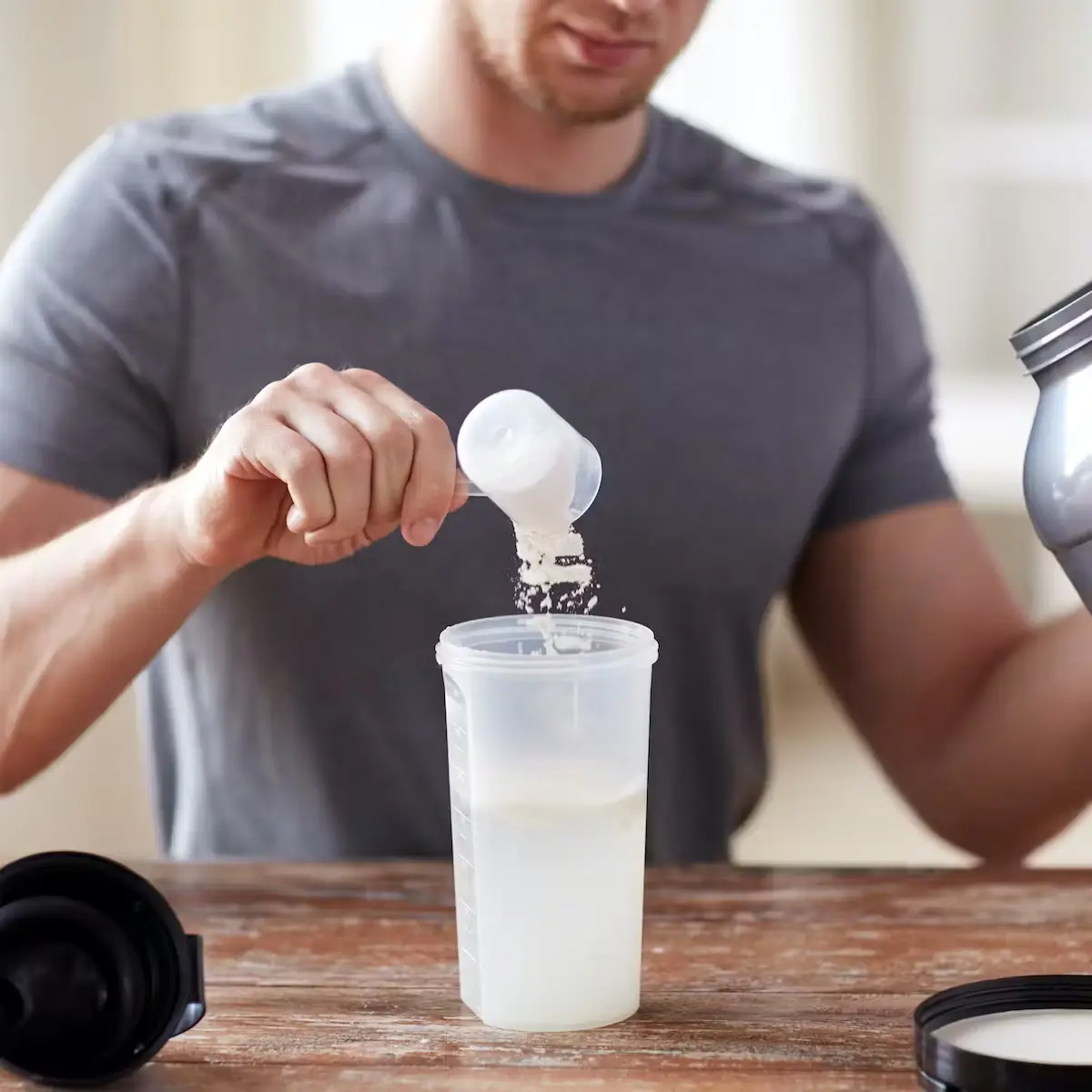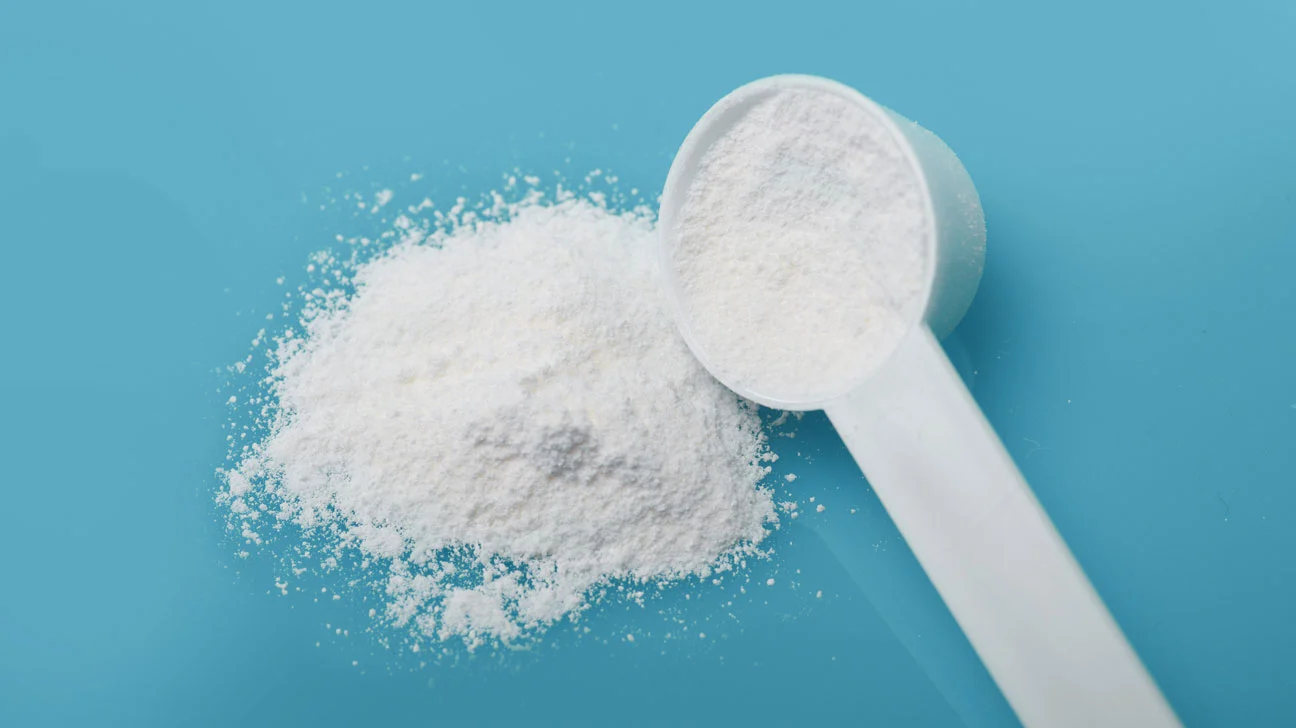What is Creatine?
Creatine is a natural substance that our body produces, in the kidneys, liver, and pancreas. It is a type of amino acid, which is a compound used to make protein, so it helps with building our bones, muscles, and damaged tissues.

Moreover, creatine is a natural source of energy that allows our bodies to endure intense physical activities. It provides the body with bursts of energy. These bursts help our muscles handle high-intensity exercises, such as sprinting and heavy lifting.
Although our body produces creatine, the food we eat controls almost half of our body’s supply of it (1-2 gram\day). It is found in various high-protein foods, such as red meat and seafood, to name a few.
Sports enthusiasts use creatine as a supplement. It strengthens the muscles, helps with recovery, and improves the body’s performance during exercises.
Why Do We Take Creatine?
Many people, especially athletes, choose to take creatine supplements. It provides the body with immense energy, so fitness lovers always go for it. Moreover, studies have proven that creatine is beneficial for post-workout recovery. Here are some potential reasons why some people choose to take creatine:
Improves Post-Workout Recovery
Studies have shown that creatine helps with muscle inflammation and damage. This speeds up the recovery process between workout sessions. Moreover, because creatine is a type of amino acid, it increases the muscles’ ability to absorb protein. This helps damaged tissues repair themselves faster. Creatine also draws more water into the muscles and increases hydration, which is a vital factor in the recovery process.
Provides the Body with Energy
To perform power exercises, our body needs Adenosine triphosphate (ATP). ATP is a basic type of energy that is stored in the cells to boost metabolism and help our muscles function properly. Yet, the body only produces enough ATP to perform 8-10 seconds of power exercises, which is not enough for an effective workout session.
Creatine increases the body’s ability to produce and store enough ATP, giving the body explosive energy. This enables the body to perform intense sports such as football, wrestling, sprinting, and more.
Helps with Muscle Growth

Creatine supplements can improve muscle cells and increase the size of the muscle itself. For example, Creatine increases muscle hydration, which, increases muscle mass. Also, taking Creatine on a regular basis alongside weightlifting may increase the size of the muscles.
When To Take Creatine?
We use creatine supplements to load the body with energy and strength. So, there are very few restrictions on when to take them. If you want to have creatine in your breakfast smoothie, for example, go ahead. You can also include it in your pre-workout shake. Taking creatine supplements before going to bed is also an option.
While you can take creatine at any time, it is proven that taking it after working out is the most effective way to do it. According to the Journal of the International Society of Sports Nutrition, taking creatine supplements post-workout is more effective than taking them pre-workout.
Although this study has highlighted the effectiveness of taking creatine supplements post-workout, many studies maintain that it’s beneficial to take them at any time.
It is always advisable to consult a healthcare provider or specialized dietician before taking creatine supplements.
How To Take Creatine?
Research has shown that the best way to start taking creatine supplements is by a loading phase. In the loading phase, you consume high doses of creatine for 5-7 days to saturate your muscles with it properly. Then, you can move to lower daily maintenance doses.

The most recommended way to take creatine is by taking 5g of creatine 4-5 times per day. This ensures that the creatine levels will increase in your muscles, achieving the best results. After the loading phase, a daily maintenance dose of 3-5g can effectively keep the level of creatine high in your muscles.
Since it is a very popular and well-studied supplement, there are many forms of creatine that you can choose from. The most researched form is Creatine monohydrate.
Creatine Benefits for Non-Athletes
People always relate creatine supplements to athletes and athletic performances. But, the benefits of creatine include more than improving muscle health and providing the body with energy.
Here are some potential benefits of creatine supplements for non-athletes:
Helps with High Blood-Sugar Levels
Studies show that creatine supplements may increase the function of glucose in the blood. This helps lower blood-sugar levels by transporting blood sugar into our muscles. A study conducted on 12 individuals has proven that if you take creatine supplements and exercise after eating a meal rich in carbs, it will help with your blood sugar control. This helps fight diabetes, as controlling blood sugar is a vital factor in fighting the disease.
Vegetarian or Vegan Diets
We find them in red meat, milk, and seafood, which are far from being a part of a vegetarian\vegan diet. Since we get half of our body’s need for creatine from our food, people who follow a vegetarian\vegan diet have a low creatine level in their bodies. This is when creatine supplements prove to be super beneficial. Vegetarians and vegans can increase creatine levels in their bodies without having to break their diet.
Improves Brain Function
While we find creatine in our muscles, it is also found in our brains. In fact, the brain is also a muscle, so creatine supplements are super beneficial for brain health. For example, creatine supplements help combat neurological diseases.
A common factor in most neurological diseases is the decrease in phosphocreatine in our brains. Researchers found that creatine supplements help increase phosphocreatine in our brains. This slows the progression of neurological diseases. Studies on animals showed that creatine supplements helped treat diseases like Alzheimer, epilepsy, and brain or spinal cord injuries.
While there are many benefits to creatine supplements for non-athletes, it is always advisable to consult a healthcare provider or specialized dietician. Moreover, more research on humans is necessary to prove the promising benefits of Creatine supplements.
Side Effects of Taking Creatine
Creatine is a safe supplement when used within the recommended dosage. Yet, some people experience side effects from it.
Some of creatine’s side effects are:
Kidney Damage:
Our kidneys produce creatine naturally and prevent its toxic buildup from going into our bloodstream. Taking creatine supplements may increase the pressure on the kidneys, especially for individuals with chronically damaged ones. But, such problems are unlikely to happen for individuals with healthy kidneys who take the recommended dosage.
Liver Damage
There is no harm in taking creatine supplements for short periods of time. Yet research shows that taking creatine supplements for more than 6 months may cause liver malfunction. Moreover, the liver produces creatine. So, taking supplements for long periods of time may affect the Liver’s ability to produce creatine naturally.
Weight Gain
Creatine can be used to increase muscle size and gain weight. Creatine increases the water level in your cells, so as you experience an increase in the mass of your muscles, your weight will increase. This could be a problem for people who want to maintain a certain weight by taking part in certain sports.
Taking Creatine before Bed
Taking creatine before going to bed is safe. It doesn’t have caffeine and is not a stimulant that can affect your central nervous system in any way. It is a digested substance, so if it doesn’t cause you stomach problems during the day, it won’t cause problems during the night.
Taking creatine supplements is beneficial for those who suffer from sleep deprivation. A study done on 10 individuals proved that taking Creatine improves the quality of sleep and enables people to function better on fewer sleeping hours.
Moreover, taking creatine supplements before bed doesn’t only improve your sleep, but also helps your brain function better. While we are asleep, our brain makes use of the ATP that creatine helps our body produce. This enables the brain to function better on tasks and makes people feel well-rested. Although taking creatine supplements before bed is beneficial, here are some things you need to consider if you choose to take creatine before bed:
- Water and hydration: Creatine draws water into the muscles, so make sure to stay well hydrated if you consume creatine before bed.
- Eating the right food before going to bed: Creatine is best absorbed when eaten alongside a meal or snack that contains carbohydrates or protein. If you choose to take creatine before bed, make sure to have had a meal or snack earlier in the evening that contains these elements.
- Sleep disruption: Some people experience sleep disruption due to taking creatine before bed. Such cases are rare, but it is important to start taking creatine during the day if it affects your sleeping pattern.
Finally, it is important to talk to a healthcare provider or dietician before taking creatine supplements.
Top Foods High in Creatine:

| Food | Milligrams of Creatine/100g |
|---|---|
| Herring | 900 |
| Salmon | 900 |
| Pork | 700 |
| Black Pudding | 600 |
| Chicken breast | 400 |
| Tuna | 400 |
| Beef cattle heart | 300 |
| Sausage | 200 |
| Tuna | 200 |
| Bacon | 100 |
Conclusion
Creatine is a compound that is naturally produced in our bodies. It provides us with the necessary energy to perform high-intensity activities. Studies prove that it is super beneficial for muscle health, recovery, and even better sleep.
We find creatine in animal products such as red meat, milk, and seafood, but in small amounts. Fitness enthusiasts and athletes opt for creatine supplements to perform power sports.
Creatine supplements are safe if you take the recommended dose. Yet, it may have some negative side effects. For example, creatine supplements may lead to liver damage, kidney damage, and weight gain.
Like any supplement, creatine has its pros and cons. So, you need to consult a healthcare provider or specialized dietician to make the most out of creatine’s benefits and avoid its drawbacks.
Taking Creatine Before Bed FAQs
When Is the Best Time to Take Creatine?
The best time to take creatine supplements is before or after exercising. Take creatine 30 minutes after your workout to provide your body with the necessary energy to do power workouts. You can also take creatine in your post-workout shake to ensure the best results for muscle health.
Why Should I Take Creatine?
Creatine supplements help your body produce extra ATP, which enables it to perform intense physical activities. Taking creatine supplements will provide your body with the necessary power and energy to practice power sports.
How Much Creatine Should I Take?
Consult a healthcare provider or a specialized dietician for a controlled dosage of creatine. The most recommended dose is 5g per day.
Does Taking Creatine Affect Your Sleep?
Creatine can affect your sleep positively, as it helps with sleep deprivation and functions on fewer hours of sleep.
Sources
Dom Abraham
As the lead content writer at Sleepiverse. Dom pours his heart into writing mattress reviews, bedding product reviews, and medically-reviewed health articles. Dom is from Portugal and likes to spend his free time writing on the beach as it gives him a sense of comfort. Aside from writing mattress reviews in front of the soothing beach view, Dom likes to experiment with new amazing food ideas.


